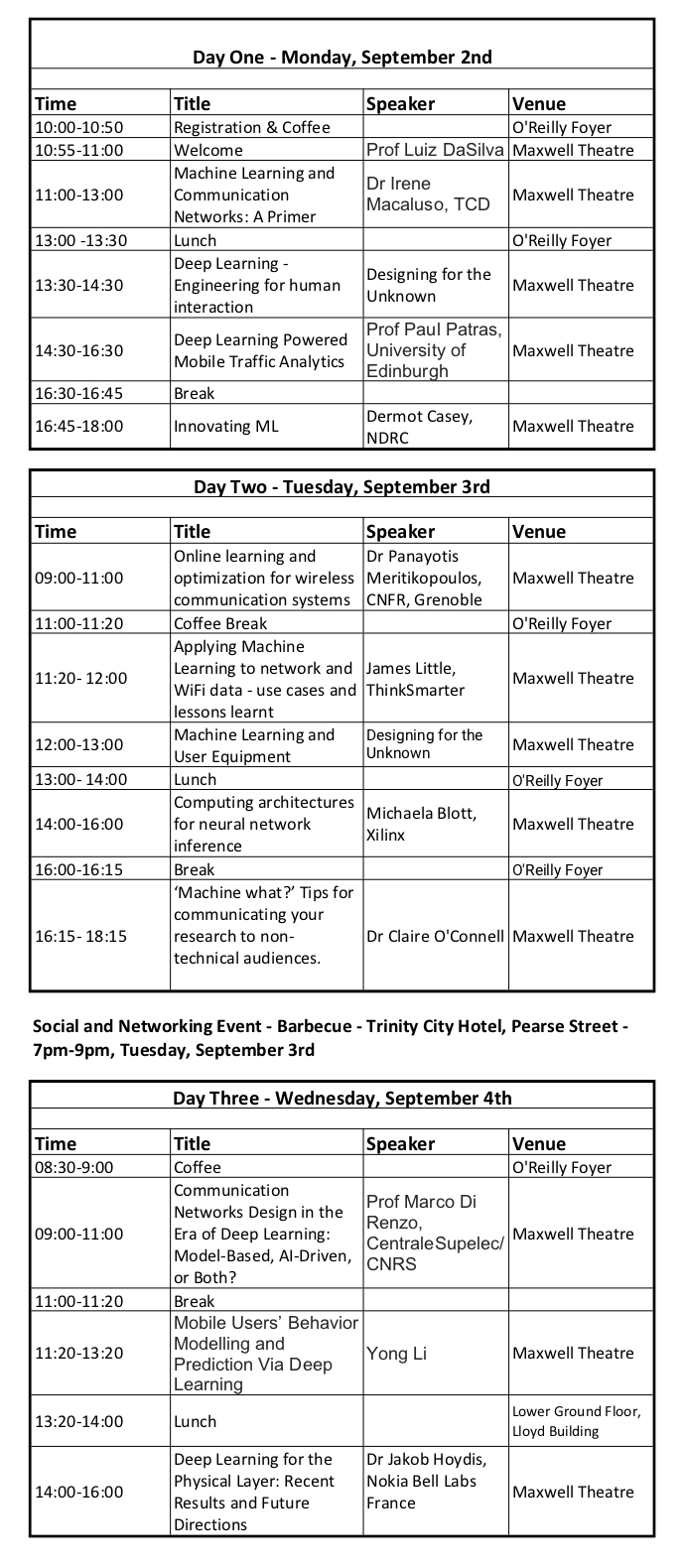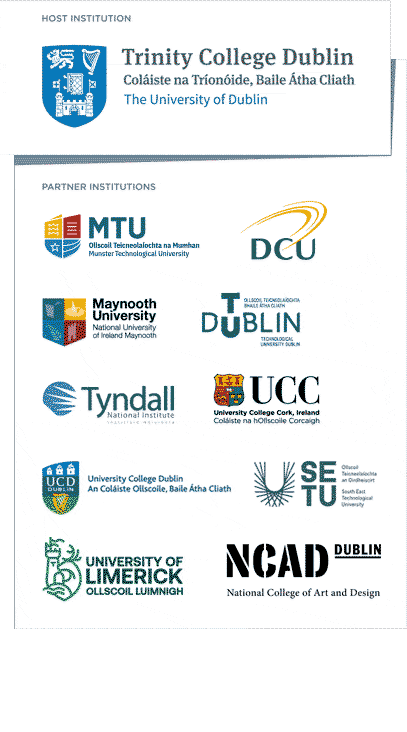The CONNECT Centre will host a Summer School on Machine Learning for Communication Systems and Networks from Monday, 2 September, to Wednesday, 4 September 2019, in Trinity College Dublin.
For queries, please email summer.school@connectcentre.ie
The school is aimed primarily at PhD students in CONNECT, but registration is now open to other researchers from academia and industry.
Registration
Registration is now closed. All places are now reserved.
Fee for CONNECT researchers (students, postdocs and staff): €50 – this discounted rate is available via a promotional code.
Fee for non-CONNECT researchers: €350.
Programme
The Summer School will include a technical track with lectures and workshops on various aspects of Machine Learning, as well as associated training in areas such as research ethics, career development, communicating research, innovation, and public engagement. It will also include social and networking events. Speakers will include Prof Marco Di Renzo (CentraleSupélec/CNRS), Dr Jakob Hoydis (Nokia Bell Labs France), Dr Irene Macaluso (Trinity College Dublin), Dr Panayotis Mertikopoulos (CNRS, Grenoble), Michaela Blott (Xilinx Research Labs, Ireland), Prof Yong Li (Tsinghua University, Beijing) and Prof Paul Patras (University of Edinburgh).
Machine Learning and Communication Networks: A Primer
Dr. Irene Macaluso, Trinity College Dublin
The literature on machine learning (ML) is so extensive that even a superficial overview of all the main ML approaches goes far beyond the possibilities of this lecture. Hence, we will focus on the features that characterize the three main classes of ML approaches: supervised learning, unsupervised learning and reinforcement learning. Semi-supervised learning, a hybrid of supervised and unsupervised learning, will also be introduced. We will delve into details of specific ML algorithms to garner some insights that can help guide you in building a successful machine learning project. We will also introduce methods for diagnosing errors in a machine learning system and prioritizing the most promising options for reducing that error.
Biography: Irene Macaluso is a Senior Research Fellow at CONNECT, Ireland’s research centre for Future Networks and Communications, based at Trinity College, Dublin. Dr. Macaluso received her Ph.D. in Robotics from the University of Palermo in 2007. Dr. Macaluso’s current research interests are in the area of adaptive wireless resource allocation, with particular focus on the design and analysis of market-based mechanisms in the management and operation of reconfigurable wireless networks and the application of machine learning to radio resource sharing. She has published more than 70 papers in internationally peer reviewed journals and conferences. She is Executive Editor of Transactions on Emerging Telecommunication Technologies (ETT) since 2016.
Communication Networks Design in the Era of Deep Learning: Model-Based, AI-Driven, or Both?
Prof. Marco Di Renzo, Paris-Saclay University / CNRS, France
Data-driven approaches are not new to wireless communications, but their implementation through deep learning techniques has never been considered in the past. However, the situation is rapidly changing, and very recently the use of deep learning has started being envisioned for wireless communications. Indeed, the increasing complexity of wireless networks makes it harder and harder to come up with theoretical models that are at the same time accurate and tractable. The rising complexity of 5G and beyond 5G networks is exceeding the modeling and optimization possibilities of standard mathematical tools. Nevertheless, purely data-driven approaches require a huge amount of data to operate, which might be difficult and/or expensive to acquire in practical large-scale scenarios. In this context, the specific field of communication theory presents a major opportunity thanks to the availability of many more theoretical models compared to other fields of science. Indeed, despite being usually inaccurate and/or cumbersome, available communication models still provide important prior information that should be exploited. Accordingly, the aim of this tutorial is to put forth the idea that theoretical modeling and data-driven approaches are not two contrasting paradigms, but should rather be used jointly to get the most out of them.
Biography: Marco Di Renzo received the Laurea (cum laude) and Ph.D. degrees in electrical engineering from the University of L’Aquila, Italy, in 2003 and 2007, respectively, and the Habilitation à Diriger des Recherches (Doctor of Science) degree from University Paris-Sud, France, in 2013. Since 2010, he has been a Chargé de Recherche CNRS (CNRS Associate Professor) in the Laboratory of Signals and Systems (L2S) of Paris-Saclay University – CNRS, CentraleSupélec, Univ Paris Sud, Paris, France. He serves as the Associate Editor-in-Chief of IEEE Communications Letters, and as an Editor of IEEE Transactions on Communications, and IEEE Transactions on Wireless Communications. He is a Distinguished Lecturer of the IEEE Vehicular Technology Society and IEEE Communications Society, and a Senior Member of the IEEE. He is a recipient of several awards, including the 2013 IEEE-COMSOC Best Young Researcher Award for Europe, Middle East and Africa, the 2013 NoE-NEWCOM# Best Paper Award, the 2014-2015 Royal Academy of Engineering Distinguished Visiting Fellowship, the 2015 IEEE Jack Neubauer Memorial Best System Paper Award, the 2015-2018 CNRS Award for Excellence in Research and Ph.D. Supervision, the 2016 MSCA Global Fellowship (declined), the 2017 SEE-IEEE Alain Glavieux Award, the 2018 IEEE-COMSOC Young Professional in Academia Award, and 7 Best Paper Awards at IEEE conferences (2012 and 2014 IEEE CAMAD, 2013 IEEE VTC-Fall, 2014 IEEE ATC, 2015 IEEE ComManTel, 2017 IEEE SigTelCom, EAI 2018 INISCOM, IEEE ICC 2019).
Deep Learning for the Physical Layer: Recent Results and Future Directions
Dr. Jakob Hoydis, Nokia Bell Labs, France
Dr. Hoydis will discuss the potential of machine learning for the physical layer and present recent results in this area. A particular emphasis will be put on the idea of end-to-end learning through autoencoders as well as deep MIMO detection. He will conclude with an exploration of interesting directions for future research.
Biography: Jakob Hoydis received the diploma degree (Dipl.-Ing.) in electrical engineering and information technology from RWTH Aachen University, Germany, and the Ph.D. degree from Supelec, Gif-sur-Yvette, France, in 2008 and 2012, respectively. He is a member of technical staff at Nokia Bell Labs, France, where he is investigating applications of deep learning for the physical layer. Previous to this position he was co-founder and CTO of the social network SPRAED and worked for Alcatel-Lucent Bell Labs in Stuttgart, Germany. His research interests are in the areas of machine learning, cloud computing, SDR, large random matrix theory, information theory, signal processing, and their applications to wireless communications. He is a co-author of the textbook “Massive MIMO Networks: Spectral, Energy, and Hardware Efficiency” (2017). He is recipient of the 2018 Marconi Prize Paper Award, the 2015 Leonard G. Abraham Prize, the IEEE WCNC 2014 best paper award, the 2013 VDE ITG Forderpreis, and the 2012 Publication Prize of the Supelec Foundation. He has received the 2018 Nokia AI Innovation Award and has been nominated as an Exemplary Reviewer 2012 for the IEEE Communication Letters. He is currently chair of the IEEE COMSOC Emerging Technology Initiative on Machine Learning for Communications.
Deep Learning Powered Mobile Traffic Analytics
Prof. Paul Patras, University of Edinburgh
Accurate understanding of mobile traffic at city scale, including the geographic distribution of data traffic consumption and how this might evolve over time, is increasingly important for precision network engineering. Gaining such knowledge is however difficult, because it requires large-scale measurement collection using dedicated equipment and significant storage. Further, common practice interpolation tools make poor predictions about traffic consumption at precise locations, while traditional time-series based forecasting methods largely estimate only trends and require continuous training. This session will present new techniques that overcome these problems by harnessing the exceptional feature extraction abilities of deep neural networks, to provide precision analytics. Prof. Patras will introduce ZipNet-GAN, a deep learning architecture that combines a Zipper Network and a Generative Adversarial Network, to infer narrowly-localised traffic consumption from coarse measurements. He will then discuss encoder-decoder neural network architectures that uniquely exploit spatio-temporal correlations inherent to mobile traffic, to perform network-wide and service-level traffic forecasting.
Biography: Paul Patras is a Reader (Associate Professor) and Chancellor’s Fellow in the School of Informatics at the University of Edinburgh, where he leads the Internet of Things (IoT) Research Programme. He held visiting research positions at the University of Brescia, Northeastern University, Technical University of Darmstadt, and Rice University. He sits on the steering committee of ACM WiNTECH, serves as an associate editor of IEEE Communications Letters, advises the ITU-T Focus Group on Machine Learning for Future Networks including 5G, and is a senior member of the IEEE. His current interests include mobile intelligence and IoT security and privacy.
Mobile Users’ Behavior Modelling and Prediction Via Deep Learning
Prof Yong Li, Tsinghua University, Beijing
Prof Yong Li will focus on characterizing mobile traffic, web and information usage traces based on large-scale and long-duration mobile big data, which is collected from a commercial mobile operator with more than 10 thousand base stations and 6.5 million users spanning over some months. He will qualitatively visualize and quantitatively characterize the spatio-temporal human behaviors in the physical-cyber space in terms of mobility, traffic consumption, social activity, etc. Based on these fundamental findings and credible models, he further predicts them via deep learning, and investigates how to utilize these important insights to deal with problems encountered with the current mobile networks, urban management, and robust cyber-physical systems.
Biography: Dr. Yong Li is an Associate Professor of the Department of Electronic Engineering, Tsinghua University. He received the B.S. degree from Huazhong University of Science and Technology in 2007, and the M. S. and the Ph. D. degrees in Electrical Engineering from Tsinghua University, in 2009 and 2012, respectively. His research interests are in the areas of ubiquitous computing, data mining and mobile computing.
Dr. Li has served as General Chair, TPC Chair, TPC Member for several international workshops and conferences, and he is on the editorial board of two IEEE journals. His papers published on UbiComp, KDD, WWW, etc. have total citations more than 6500. Among them, ten are ESI Highly Cited Papers in Computer Science, and five receives conference Best Paper (run-up) Awards. He received IEEE 2016 ComSoc Asia-Pacific Outstanding Young Researchers and Young Talent Program of China Association for Science and Technology.
Online learning and optimization for wireless communication systems
Panayotis Mertikopoulos, Laboratoire d’Informatique de Grenoble, Grenoble, France.
Spurred by the enthusiasm surrounding the applications of machine learning techniques to wireless communications (and, in particular, the Internet of things), the algorithmic tools of online optimization have found widespread use in problems where the trade-off between data exploration and exploitation plays a predominant role. This trade-off is of particular importance to several branches and applications of wireless communications, from power control and green communications to wireless packet routing and MIMO signal covariance optimization (to name but a few). The aim of this talk is to provide a gentle introduction to online optimization and learning algorithms that are asymptotically optimal in hindsight – i.e., they approach the performance of a virtual algorithm with unlimited computational power and full knowledge of the future, a property known as no-regret. Particular attention will be devoted to identifying the algorithms’ theoretical performance guarantees and to establish links with classic optimization paradigms (both static and stochastic). To allow a better understanding of this toolbox, we will discuss in detail several examples from wireless communications and signal processing.
Biography: Panayotis Mertikopoulos received the Ptychion degree in physics (summa cum laude) from the University of Athens in 2003, his M.Sc. and M.Phil. degrees in mathematics from Brown University in 2005 and 2006 (both summa cum laude), and his Ph.D. degree from the University of Athens in 2010. During 2010–2011, he was a post-doctoral researcher at the Ecole Polytechnique, Paris, France. Since 2011, he has been a CNRS Researcher at the Laboratoire d’Informatique de Grenoble, Grenoble, France.
P. Mertikopoulos has co-authored 30 journal papers, more than 50 conference papers, and a software suite for the numerical integration and visualization of game dynamics. He is serving on the editorial board and program committees of several journals and conferences on learning and optimization (such as NeurIPS and ICML). His main research interests lie in learning, optimization, game theory, and their applications to networks and machine learning systems.
‘Machine what?’ Tips for communicating your research to non-technical audiences Dr Claire O’Connell
This session will focus on how we can communicate technical concepts such as machine learning to non-technical audiences. In particular, it will focus on techniques for communicating machine learning in the context of communication networks.
Biography: Irish Science Writer of the Year (2016), Dr Claire O’Connell is a regular contributor to The Irish Times and Silicon Republic. She holds a PhD in cell biology (pharmacology) from University College Dublin, where she is an Adjunct Professor. Previously, she carried out post-doctoral research at the University of Glasgow and the University of Sydney.
Claire has worked for various companies as a technical writer and holds a Master’s in Science Communication from Dublin City University. She has written for several high-profile national and international publications and authored the Science Apprentice series for children.
CONNECT is the world leading Science Foundation Ireland Research Centre for Future Networks and Communications. CONNECT is funded under the Science Foundation Ireland Research Centres Programme and is co-funded under the European Regional Development Fund. We engage with over 35 companies including large multinationals, SMEs and start-ups. CONNECT brings together world-class expertise from ten Irish academic institutes to create a one-stop-shop for telecommunications research, development and innovation.
Events



